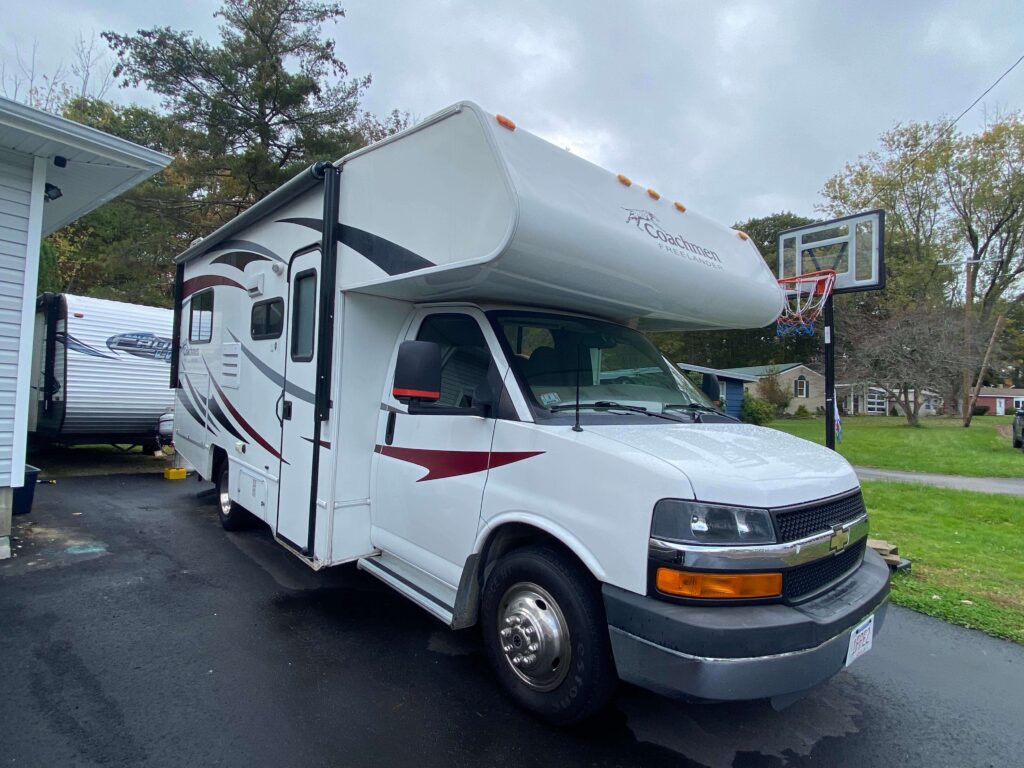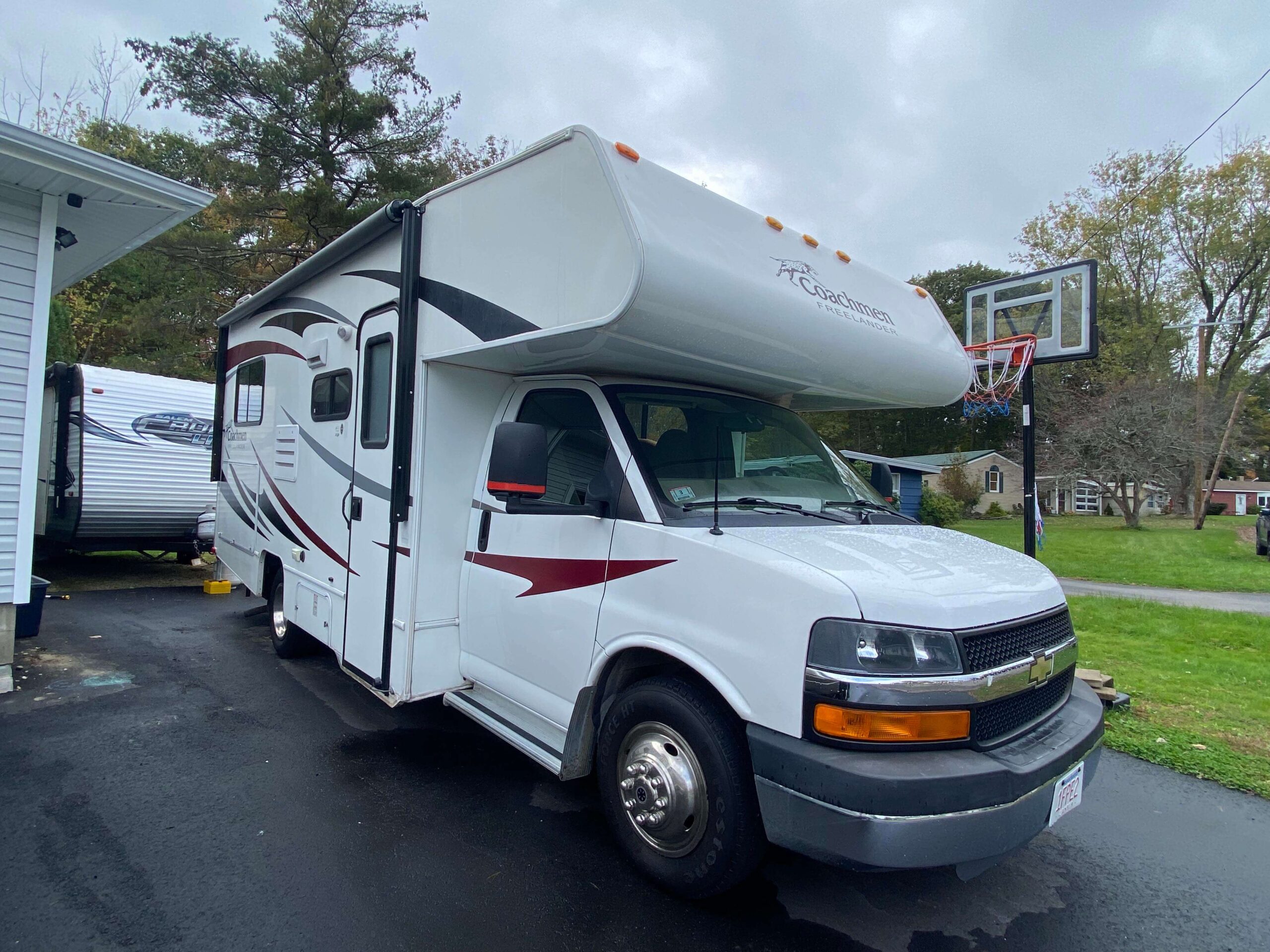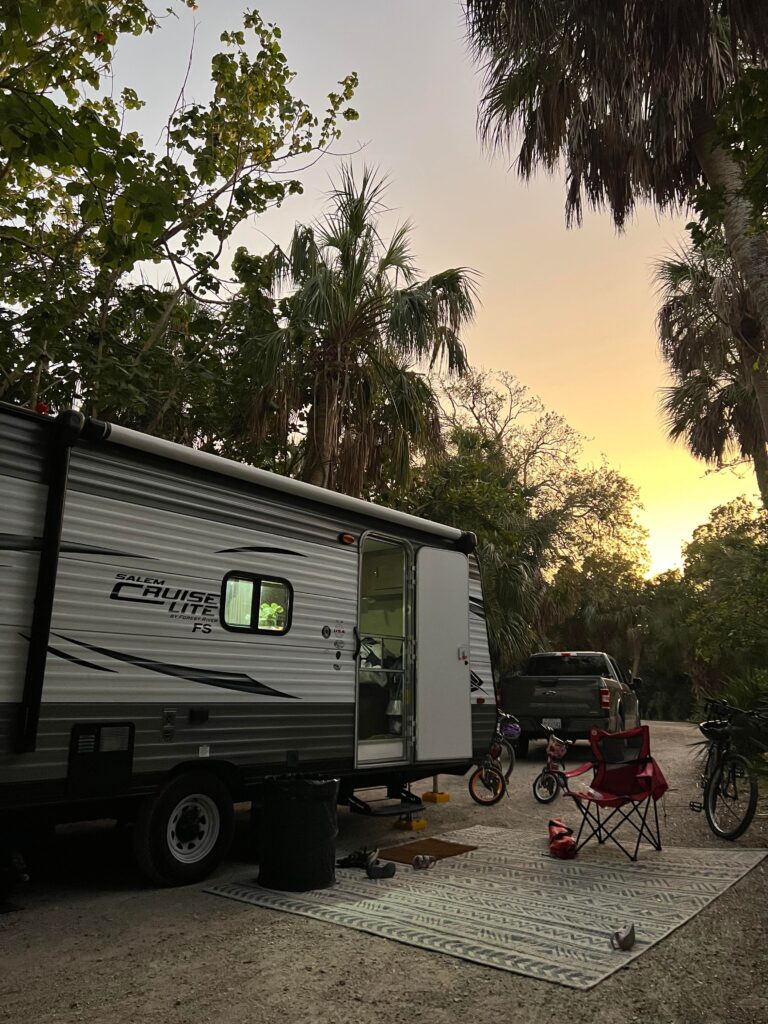Choosing for Your Adventures: RV Class A vs Class C
Starting on the exciting journey of recreational vehicle (RV) ownership opens up a world of possibilities for exploration and adventure. When it comes to selecting the perfect RV, the decision often boils down to the classic debate: RV Class A vs Class C.
The draw of the open road, the freedom to travel at your own pace, and the comforts of home on wheels make RV life an appealing choice for many.
We recently purchased a Class C camper after many years of owning a travel trailer. Our family looked at many options (Class C vs Class A) and we landed on the option we deemed was best for our family’s needs.
In this comprehensive guide, we will dive into the differences that we learned about between these two popular categories to help you make an informed decision for your next adventure.
- Overview: RV Class A vs Class C
- Driving Experience: RV Class A vs Class C
- Amenities and Comfort: Class A Extravagance vs Class C Efficiency
- Cost Considerations: RV Class A vs Class C Budgeting
- Versatility: RV Class A vs Class C
- Why not buy a Class C RV?
- What are the disadvantages of a Class A RV?
- Final Thoughts: Choosing Your RV Adventure

Overview: RV Class A vs Class C
To begin our exploration, let’s grasp the fundamental designs that distinguish Class A and Class C RVs.
Class A RVs are the giants of the highway, resembling large buses.
On the other hand, Class C RVs are characterized by their distinctive over-cab sleeping area, often resembling a truck or van chassis.
RV Class A vs Class C: Size Matters
One of the most evident disparities between Class A and Class C RVs is their size.
Class A RVs, being the behemoths of the road, offer more living space and storage. With their bus-like structures, these RVs are ideal for those who prioritize spacious interiors and don’t mind navigating a larger vehicle.
Class C RVs, while still roomy, are more compact in comparison. Their size is often compared to a large truck or van, making them more manageable on the road and in campgrounds.
This difference in size is crucial for those who value maneuverability and flexibility in their travels.
Driving Experience: RV Class A vs Class C
RV Class A: Commanding the Road
Driving a Class A RV is almost like piloting a small tour bus. The elevated driver’s seat provides an excellent vantage point, and the overall driving experience is similar to handling a large vehicle.
Class A RVs are designed for those who prioritize a commanding view of the road and the ability to cover vast distances in style.
RV Class C: A Nimble Approach
In contrast, Class C RVs offer a more familiar driving experience. With a design resembling a truck or van, the driver sits in a conventional cabin, making it feel more like driving a traditional vehicle.
The over-cab sleeping area might take some getting used to in terms of visibility, but overall, Class C RVs are applauded for their more nimble and user-friendly driving dynamics.
RV Class A vs Class C: It all comes down to personal preference.
If you love the idea of cruising down the highway with an unobstructed view in a luxurious home on wheels, a Class A RV might be your ideal choice.
However, if you prefer a more familiar driving experience with the added convenience of a sleeping area above the cab, a Class C RV could be the perfect fit.
Amenities and Comfort: Class A Extravagance vs Class C Efficiency
RV Class A: Home on Wheels
Class A RVs are synonymous with luxury. These grand vehicles often boast spacious interiors, complete with full-sized kitchens, bathrooms, and living areas.
Some high-end Class A models even feature amenities like washer/dryer units, walk-in closets, and entertainment systems that rival a home theater.
RV Class C: Compact Comforts
While Class C RVs might not offer the same level of opulence as their Class A counterparts, they certainly don’t skimp on comfort.
The over-cab sleeping area is a distinctive feature, providing additional sleeping space without sacrificing the compact design.
Class C RVs are perfect for those who prioritize efficiency and practicality without compromising on the essential comforts of home.
RV Class A vs Class C: Your choice depends on your lifestyle and preferences.
If you envision your RV as a luxurious retreat on wheels, complete with all the bells and whistles, a Class A is the way to go.
However, if you lean towards a more modest yet efficient setup, a Class C RV might suit your needs perfectly.
Cost Considerations: RV Class A vs Class C Budgeting
RV Class A: Deep Pockets Required
The grandeur of Class A RVs comes at a price, quite literally. These majestic vehicles often come with a hefty price tag, reflecting their size, amenities, and luxurious features.
Maintenance costs, fuel consumption, and campground fees for larger spaces can also contribute to the overall expense of owning a Class A RV.
RV Class C: Budget-Friendly Travel
For those seeking a more budget-friendly RV experience, Class C is often the more economical choice. The initial purchase price tends to be lower, and operational costs, including fuel efficiency, are generally more manageable.
Campground fees may also be lower, thanks to the smaller footprint of Class C RVs.
RV Class A vs Class C: Your budget will play a significant role in determining the type of RV that suits your lifestyle.
If money is no object and you crave the epitome of RV luxury, a Class A RV may be worth the investment.
However, if you’re budget-conscious and prefer to allocate your funds to experiences on the road, a Class C RV offers an attractive balance of comfort and affordability.
Versatility: RV Class A vs Class C
RV Class A: The Grand Tourer
Class A RVs are built for the long haul, both in terms of distance and duration. These vehicles are ideal for full-time RV living, providing all the amenities one might need for an extended stay on the road.
With their spacious interiors and luxurious features, Class A RVs are the grand tourers of the RV world.
RV Class C: Weekend Warriors
While Class C RVs can certainly handle extended trips, they are often favored by those who embark on shorter adventures.
Their compact size and efficient design make them well-suited for weekend getaways or vacations where maneuverability and ease of use are paramount.
Class C RVs are the perfect choice for those who want the flexibility to travel frequently without committing to a full-time RV lifestyle.
RV Class A vs Class C: Your choice depends on the nature of your travels.
If you’re planning to live on the road full-time or take extended journeys, a Class A RV might be the perfect companion.
On the other hand, if you see RVing as a part-time pursuit for shorter vacations and weekend escapes, a Class C RV provides the versatility you need.

Why not buy a Class C RV?
A reason not to buy a class C RV is the potential for water damage. The over-cab sleeping area will at one point or another leak, it is inevitable. As long as you know that going into it, and you reseal and check your camper annually, you can avoid expensive water damage.
What are the disadvantages of a Class A RV?
A major disadvantage of a Class A RV is the layout. Because of the over-cab sleeping area a class C can have more versatility in layout that a class A can.
Final Thoughts: Choosing Your RV Adventure
In the grand debate of RV Class A vs Class C, there’s no one-size-fits-all answer. Your decision should be based on a careful consideration of your preferences, budget, and intended use.
Whether you opt for the luxurious grandeur of a Class A RV or the nimble efficiency of a Class C RV, the open road awaits, ready to unveil the wonders of your next adventure.
Remember, it’s not just about the destination; it’s about the journey, and the RV you choose will play a significant role in shaping your road-tripping experience.
So, buckle up, hit the road, and let your chosen RV class be the vehicle that propels you towards a lifetime of unforgettable memories. Happy travels!

More Resources:
4 Reasons to take a Travel Trailer Camping





